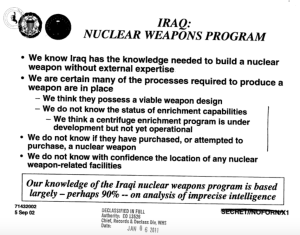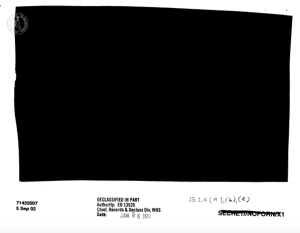What We Don’t Know about What Rummy Didn’t Know
 Earlier this week, Politico did a story on a report done for Donald Rumsfeld in summer 2002 about what the Joint Chiefs of Staff’s Intelligence team knew about Saddam’s WMD program.
Earlier this week, Politico did a story on a report done for Donald Rumsfeld in summer 2002 about what the Joint Chiefs of Staff’s Intelligence team knew about Saddam’s WMD program.
There are two specifics of significant note the Politico report doesn’t get into. First, it notes that the report itself was dated September 5 and Rumsfeld passed it on to Richard Myers, saying, “It is big” on September 9. But it neglects one significant detail about the date.
The report said “we think a centrifuge enrichment program is under development but not yet operational.” Someone — presumably either Rummy or Myers — marked that passage in the Powerpoint. That same person also marked an earlier slide that said “Our assessments rely heavily on analytic assumptions and judgment rather than hard evidence,” though that person did not mark the following line that read, “The evidentiary base is particularly sparse for Iraqi nuclear programs.”
Those dates are significant, however, because between the time the report was finished on September 5 and Rummy passed it on on September 9, both he and Myers did the Sunday shows as part of the aluminum tube bonanza, which itself was premised on the claim that Iraq had tried to obtain those tubes because they “were intended as components of centrifuges to enrich uranium.” (On Saturday, at least Rummy and possibly Myers spent the day at Camp David with other top Bush officials and Tony Blair planning to get their war on.)
To be fair to them both, they didn’t say anything that greatly varied from this report (in any case, both may not have read it yet) or even directly address the centrifuge story.
The secretary also asserted that Iraq is on the list of the world’s terrorist states, and under Saddam Iraq continues to possess chemical and biological weapons, and seeks to acquire nuclear arms, as well. As such, he said, Iraq represents a clear and present danger to America — and to the world.
Show host Bob Schieffer asked Rumsfeld if the United States was close to going to war against Iraq. The secretary said President Bush has decided that a regime change in Iraq is necessary, but hasn’t yet decided how it would be accomplished. The nation’s leader is slated to go before the United Nations to “make what he believes to be is a recommendation to the international community and to the world” about what to do about Saddam and Iraq, Rumsfeld said.
Iraq, Rumsfeld said, has invaded its neighbors, persists in violating U.N. resolutions it had agreed to, and continues to amass weapons of mass destruction, creating a significant problem for the international community.
The world can approach the problem of Saddam in a number of ways, Rumsfeld remarked. However, he emphasized that he agrees with the president in that doing nothing is not an option.
People seeking a “smoking gun” — absolute, conclusive evidence that Saddam has nuclear weapons — Rumsfeld noted, is like developing a case in a court of law by proving a person’s guilt without a reasonable doubt.
“The way one gains absolute certainty as to whether a dictator like Saddam Hussein has a nuclear weapon is if he uses it. And that’s a little late,” Rumsfeld emphasized.
The secretary pointed out how some U.S. intelligence on Iraqi capabilities may not be revealed to the public for good reason. Putting certain intelligence out to the public could “put people’s lives at risk,” he noted. However, the secretary said more information about Iraq would likely become known in the days and months ahead.
Rumsfeld noted there is also “a category of things we don’t know.” After Operation Desert Storm, he noted, American officials discovered that Saddam was six months to a year away from developing a nuclear weapon. The best previous intelligence had estimated it would take two to six years for Saddam to obtain a nuclear bomb, Rumsfeld said. [my emphasis]
Indeed, while Rummy used a variant of the “smoking gun” line Condi Rice used, he presented it more as a legalistic phrase than the fearful line the National Security Advisor delivered it as. He stressed that US intelligence was withholding information. And he admitted that there was stuff “we don’t know,” though suggested that in the past the stuff we didn’t know ended up being that Saddam was closer to getting nukes than previously believed.
And Myers, too, emphasized Saddam’s quest to improve his nuke program.
Air Force Gen. Richard B. Myers, chairman of the Joint Chiefs of Staff, reiterated to ABC This Week host Sam Donaldson that Saddam Hussein has chemical and biological weapons.
Saddam, Myers added, also wants “to better his nuclear program.”
“He’s going to go to any means to do that, we think,” he said. “Our estimate is at this point he does not have nuclear weapons, but he wants one.”
Basically, though, it appears that after Rummy and Myers had just been put on the Sunday shows to reinforce the hysteria Condi and Cheney were sowing, Rummy read a report and learned that his own intelligence people were none too sure about what he and Myers had just said, at which point he sent it to Myers and said “it is big.”
 At that point, it was probably too late.
At that point, it was probably too late.
The other thing Politico didn’t note, however, is that the actual Powerpoint was not entirely declassified. Indeed, the entire last page was redacted under 1.4 a, b, and c exemptions.
1.4(a) military plans, systems, or operations;
1.4(b) foreign government information;
1.4(c) intelligence activities, sources or methods, or cryptology;
I find that interesting because the Iraq foreign government information in the presentation is no longer considered sensitive, so it presumably cites some other foreign government information.
I suspect the redacted information either cites the equally dubious British intelligence claiming Saddam had WMD or that it invokes Saddam’s ties to terrorism (which both Rummy and Myers did mention in their Sunday appearances). If it’s the latter, it would mean the government is still trying to hide — as it is with a letter Carl Levin tried but failed to get declassified before he retired — the utterly bogus claims about Saddam having ties to Al Qaeda that were partially used to justify the war.
All of which is to say, we know that Rummy probably learned a bit more about what his unknown unknowns immediately after going on a the Sunday shows making a claim about known unknowns. But there’s still something about what Rummy didn’t know that we don’t know.
